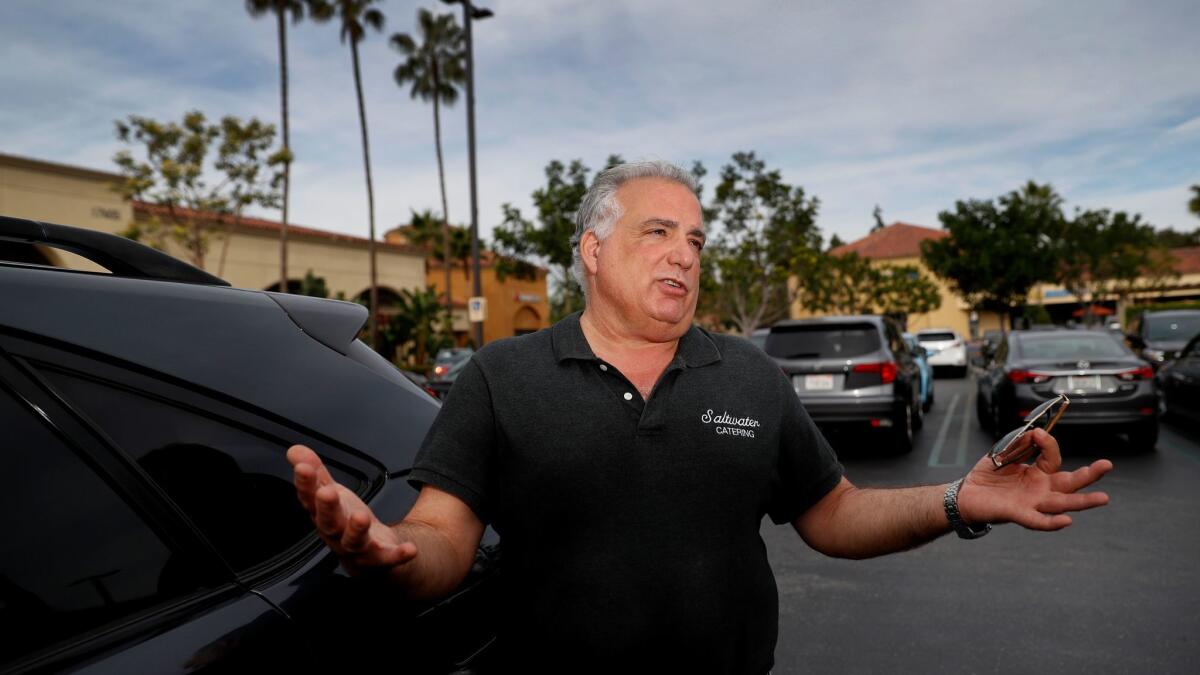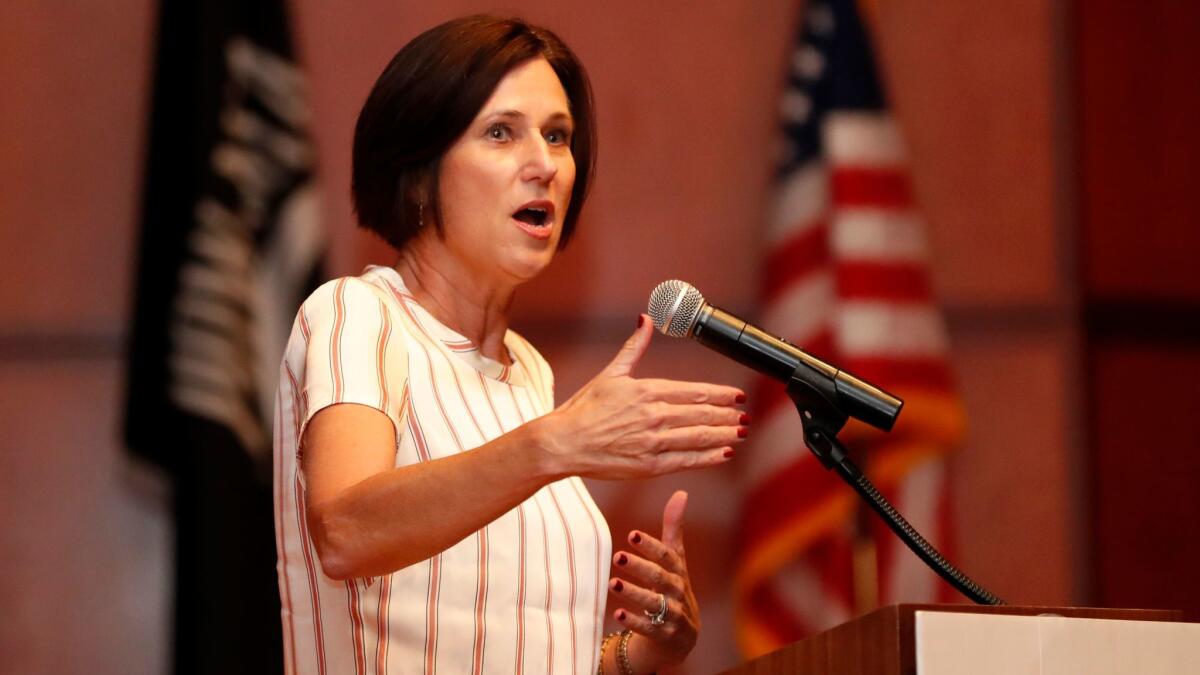On Politics: In Orange County, fear and loathing for the GOP’s “Screw California” tax bill

- Share via
Reporting from Tustin, Calif. — Chris Keena feels obliged to explain: He really is a Republican — honest! — before launching his critique of the Republican tax bill that just passed the House.
“I don’t believe in trickle-down theory,” said the 70-year-old retired attorney from Irvine. “The money they save — I’ve seen it in business — the money they save at the top, they keep at the top. It doesn’t trickle down.
“I hate to sound like a radical,” he went on, “and I guess it doesn’t go with being a Republican, but it’s a reality. There are a lot of people struggling here. The image is everyone is fat and happy. They’re not. They’re not.”
The sweeping tax-cut package, which passed Thursday with overwhelming support from California’s GOP House members, seems almost singularly designed to punish the state and its Democratic legion of Trump tormentors.
Eliminating most of the deduction for state and local taxes would be a hefty blow to millions of Californians. The same for a proposed cap on deducting property taxes and mortgage interest — write-offs that make the purchase of that charming $750,000 “starter home” a bit more attainable, if no less insane.
It goes on.
Repealing tax incentives that help pay for low-cost housing would almost surely exacerbate a desperate housing shortage, which is already stifling job growth.
And in a move that seems just plain spiteful, the bill would take away the deduction for uninsured personal losses from wildfire and earthquakes, two of California’s great tribulations, while preserving it for hurricane victims.
“It may be a tax cut for Wisconsin and Kansas and Iowa. But it is not a tax-cut bill for individual taxpayers in California,” said Carolyn Cavecche, head of the Orange County Taxpayers Assn., which is not exactly a hotbed of Marxist sentiments.
It may be a tax cut for Wisconsin and Kansas and Iowa. But it is not a tax-cut bill for individual taxpayers in California.
— Carolyn Cavecche, head of the Orange County Taxpayers Assn.
With scant room to spare, GOP House leaders needed almost the entire 14-member California Republican delegation to move their tax plan forward. All save three — Tom McClintock, Darrell Issa and Dana Rohrabacher — voted yes.
That carries no small risk, especially here in Orange County, where lawmakers high on the Democratic target list, including Issa and Rohrabacher, are caught between constituents losing their cherished deductions and party chiefs demanding fealty.
Mimi Walters, a second-term congresswoman from Irvine, was another in that bind.
California could flip the House, and these 13 races could make the difference »
Her district, extending roughly from Anaheim Hills south to Mission Viejo, is one of the most affluent in California, and taxpayers there are some of the biggest beneficiaries of the state and local tax deductions, as well as the write-off for mortgage interest.
Some, like Jim Nowakowski, are convinced the big cut in corporate taxes will bring more jobs and, as advocates promise, greater prosperity all around.
“If I had money sitting offshore and could bring it back at a lower tax rate and hire another 30, 40 people, grow my plant, I’d do that in an instant,” said Nowakowski, 75, who owns a business that cleans and repairs costumes for Disneyland.
Losing some deductions would be worth the trade-off, said the Tustin resident, especially if it made Sacramento think harder about spending. “Maybe they don’t have so many damn taxes on people,” he said.
But in two days of conversation around the district, many more viewed the tax bill as an unwarranted giveaway to the rich, paid for by those already struggling to stay afloat.
And it wasn’t just partisan Democrats.
Scott Tullius, 47, who calls himself a libertarian-leaning independent, said deducting thousands of dollars in mortgage interest on his Lake Forest home boosts the tax refund he relies on each year.
“With three kids” — ages 6 to 16 — “there’s things that wouldn’t get done without it,” said Tullius, who works for Irvine’s Office of Emergency Management. “For the working-class person, we’re just making it by week to week, month to month.”

Oldrich Kolar, who runs a Tustin law firm, questioned the haste of pushing through tax legislation just so Republicans can say they did so once the calendar turns to the election year 2018.
By the time it gets around to final passage — should the legislation make it that far — “I just hope … we’ve had enough debate, a conscious, smart debate, so we’re not just trying to make a political statement, we’re not just trying to make a timing statement,” said the 53-year-old Republican and self-described member of “the top 1% to 2%.”
Walters said she supported the bill after being assured changes would be made once House lawmakers hash out their differences with the Senate, which is weighing its own version of a tax-cut bill. That, of course, assumes the Senate is kinder to California — no sure bet — or doesn’t kill the effort entirely, leaving those like Walters on a sawed-off limb.

Back in the 1980s, lawmakers decided to stuff the country’s nuclear waste in a big hole in the Nevada desert.
The backroom deal, which eliminated sites in Texas and Washington state from consideration, was greased by the fact no one from Nevada was around to object.
The proposed dump at Yucca Mountain, about 100 miles outside Las Vegas, immediately sparked political warfare and remains stalled all these years later. But the treachery is still renowned as the “Screw Nevada Bill.”
The Republican tax legislation, as it stands, could carry the same blunt appellation as regards California.
Woe to those defending it in an already tough political climate: Voter indignation is not something you can just bury in a desert hole.
@markzbarabak on Twitter
ALSO
See how California’s lawmakers voted on the tax plan
Here’s why California’s early 2020 primary is destined to pick the next president. (Nah, not really)











